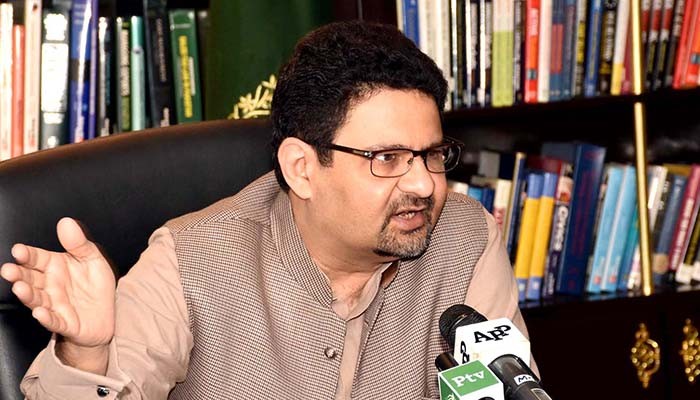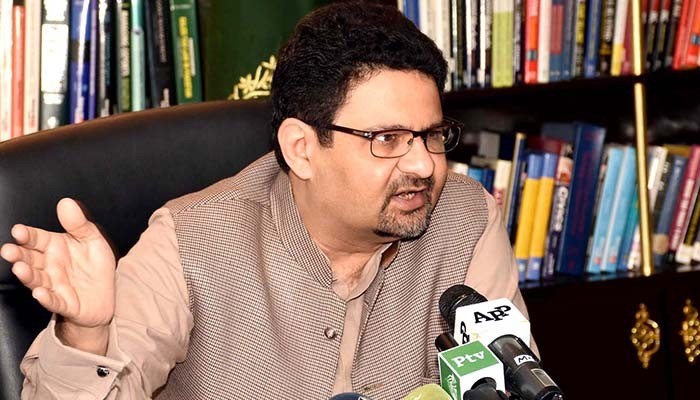Miftah says no 'further need' for rupee devaluation
The PM's financial adviser says he is 'confident' that the Pakistani economy will achieve 6.25% GDP growth next year
April 21, 2018
WASHINGTON: The Pakistani rupee will not be devalued any further, the Adviser to the Prime Minister on Finance, Revenue and Economic Affairs, said early Saturday morning, reiterating his comments from last month when he said the currency would "remain stable" after having "found its optimum value".
Miftah Ismail, the premier's financial adviser, noted that growth in fiscal year 18 (FY17-18) was registered at 5.8 percent. He added that the figure would rise upwards of 6.0 percent in the upcoming fiscal year.
During an interview with Bloomberg, a leading American media outlet focusing on stock markets and finance, he explained: "We have had 5.8 percent growth this year, and even last year's growth was revised upwards to 5.4 percent.
"Next year, we are targetting 6.25 percent growth … so, I think with the new power plants coming in — that we have installed with the help of the China Pakistan Economic Corridor — [and] with other economic activities coming into play for next year, I'm very confident that we should be able to get to 6.25 percent of GDP growth."
The adviser noted the two times the Pakistani rupee was devalued, which, coupled with an inflation rate that is not worrisome, means there would no "further need for the devaluation right way".
"I thought the right thing to do was to devalue the currency, (which) we did twice — 5 percent in December, 5 percent in March — luckily, there hasn't been any inflation in Pakistan, so far the inflation is less than 4 percent for the first nine months, so the government of Pakistan has a lot of policy choices.
"I see good things happening right now, and I don't see any further need for the devaluation right way," he said.
'A good thing'
Earlier, on March 22, Ismail had said the decision to devalue the Pakistani rupee was taken after a thorough deliberation, including a consideration of the prevalent conditions, and the price of the US dollar bumped up to Rs 115.
Speaking on Geo News' programme Aaj Shahzeb Khanzada Kay Sath, Ismail had noted: "We have [taken and] halted it at Rs 115, which is where the market will settle in a day or two."
He had commented on how that the market will calm down to the level the dollar value has been set at soon despite the money exchange companies' large margin.
"Although the money [exchangers] right now are carrying quite a big gap, the market will settle at Rs 115. For the foreseeable future, this is enough … for the next six to eight months, a year … there is no need for further devaluation."
"The currency will remain stable at this level; the Pakistani rupee has found its optimum value," he said.
Importantly, Ismail had also stressed that Pakistan was not entering any IMF (International Monetary Fund) programme.
Prior to that, Ismail on March 21, had said on Twitter that the "current devaluation is also a step in the right direction".
Ismail had termed the devaluation it "a good thing" that will "bring increased growth and jobs into the economy while addressing our current account deficit.
"Our economic growth this year will be the highest in 10 years and we will have healthy forex reserves at year-end," he wrote.
FATF's grey list
Apart from that, Ismail, while speaking to Bloomberg on Saturday, further said Pakistan would implement the conditions put forward by the Financial Action Task Force (FATF) — alternatively known as the Groupe d'Action Financière (GAFI).
Earlier, it was reported that Pakistan was to present a consolidated plan against money laundering to the FATF next month in order to avoid being added to a grey list of the global money-laundering watchdog.
In February, the Foreign Office of Pakistan said the country could be placed on the FATF's grey list by June this year.
The group's member states were persuaded by Washington to place Pakistan back on the “grey list” of nations with inadequate terrorist financing or money laundering controls. It is noteworthy that the nation was on the list for three years until 2015.
On April 5, Prime Minister Shahid Khaqan Abbasi had announced a reduction in income tax rates and an amnesty scheme aimed at broadening the government's revenue base.














